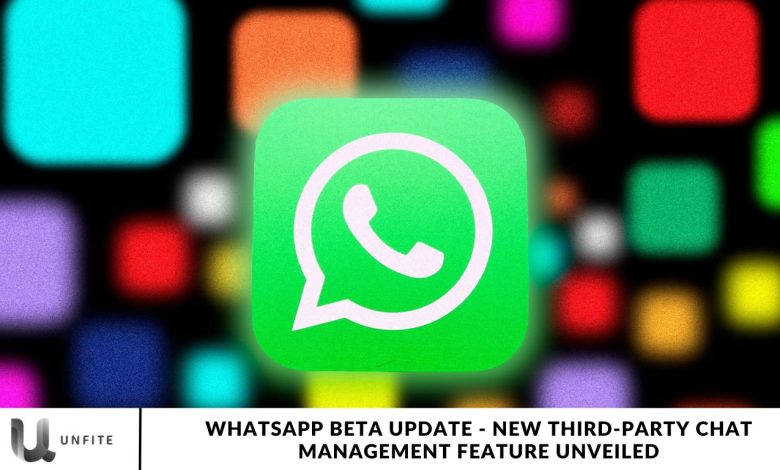WhatsApp Beta Update – New Third-Party Chat Management Feature Unveiled

WhatsApp, the leader in the messaging landscape, consistently enhances its platform and introduces innovative features. Recently, the company announced an upcoming third-party chat management feature in its latest WhatsApp beta update.
This new feature aims to give users greater control over their messaging experience. Let’s explore the details of this exciting addition and how it will improve user functionality on WhatsApp.
Third-party chat management feature in WhatsApp beta update
WhatsApp Enhances User Experience with New Third-Party Chat Information Feature for Improved Interoperability
WhatsApp is developing a third-party chat information feature to enhance chat interoperability. This innovative feature will display the name of the external app from which the chat originated, offering users greater transparency and context regarding their conversations with external platforms.
What is the WhatsApp third-party chat management feature?
Third-Party Chat Management Feature: Empowering User Control on WhatsApp
The new third-party chat management feature will allow users to customize their interactions with third-party chats. This feature includes several vital functionalities:
- Toggle Chat Interoperability Service: Users can completely turn the Chat Interoperability service on or off. When turned off, users will not be able to send or receive messages from other messaging apps on WhatsApp.
- Block Specific Apps: Users will be able to block particular messaging apps from sending messages to their WhatsApp account. For example, if spam messages from a specific app are bothersome, users can easily block them.
- Hide or Show Third-Party Chats: Users can decide whether to display third-party chats in their chat list. This option is handy for those who do not engage with external chats and want to keep their chat list organized.
How will third-party chats work?
While the specifics of how third-party chats will be implemented on WhatsApp remain unclear, reports suggest that these chats will be organized in a separate section. This designated area will enable users to view messages originating from other platforms independently.
WhatsApp anticipates utilizing the open-source signal protocol in conjunction with other messaging services to ensure end-to-end encryption. This means that while WhatsApp itself will not have access to your messages, other messaging services may store them on their servers.
Pros and Cons of WhatsApp Third-party chat management feature

Pros:
- Streamlined Communication: Facilitates more accessible communication between users across different messaging apps.
- Unified Messaging Experience: Allows users to access multiple messaging services within a single application.
- DMA Compliance: Assists in meeting Data Management and Accountability compliance requirements.
Cons:
- Privacy Concerns: Messages may be stored on the servers of third-party messaging services, raising potential privacy issues.
- Increased Risk of Spam and Fraud: There may be a higher likelihood of encountering spam and fraudulent messages.
- Feature Incompatibility: Users may experience discrepancies in features and functionality between various messaging services.
What is the Third-Party Chat Management Feature?
Explanation of the Third-Party Chat Management Feature
The third-party chat management feature in WhatsApp is designed to facilitate seamless communication between users across various messaging platforms. This innovative addition enables users to receive and manage messages from external apps directly within WhatsApp, streamlining their messaging experience.
Purpose of the Feature
This feature’s primary purpose is to enhance chat interoperability, allowing users to connect with friends, family, or colleagues who may be using different messaging services. By integrating third-party chats into WhatsApp, the feature aims to eliminate the fragmentation that often occurs when users have to switch between multiple apps to stay connected.
Enhancing User Experience and Communication
Unified Messaging Hub:
- By allowing users to view and interact with messages from different platforms within WhatsApp, the feature creates a unified messaging hub. This centralization simplifies communication and reduces the hassle of managing multiple apps.
Improved Accessibility:
- Users can effortlessly engage in conversations from various messaging services without leaving the WhatsApp environment. This accessibility is particularly beneficial for individuals who juggle multiple communication channels, enabling them to respond promptly and stay engaged.
Greater Control and Customization:
- The feature empowers users with control over their messaging preferences, allowing them to choose how they want to interact with third-party chats. They can turn the chat interoperability service on or off, block specific apps, and even hide or show third-party chats, tailoring their messaging experience to their needs.
Streamlined Communication:
- With the ability to communicate seamlessly across different platforms, users can avoid the frustration of missing important messages or notifications. This streamlined approach enhances overall communication effectiveness and fosters better connections between users.
Enhanced User Satisfaction:
- This feature is likely to increase user satisfaction by addressing the common pain points associated with using multiple messaging apps. The convenience of managing chats in one place enhances the overall user experience, encouraging more interactions and engagement within the app.
Key Features of the Third-Party Chat Management
Chat Interoperability Service
Description of the Toggle Option
The Chat Interoperability Service allows users to toggle the feature on or off at their discretion. When activated, this service enables the receipt and management of messages from various third-party messaging apps directly within WhatsApp. Users will have a simple toggle switch in their settings that provides immediate control over this feature.
Implications for Users Who Disable This Feature
If users choose to disable the Chat Interoperability Service, they will no longer be able to send or receive messages from external messaging platforms within WhatsApp. While they can continue using WhatsApp for their usual chats, any communications from other messaging services will be blocked. This feature caters to users who prefer to keep their conversations within a single app for privacy or organizational reasons.
Blocking Specific Apps
How Users Can Block Unwanted Messaging Apps
Users will be able to block specific third-party messaging apps from sending messages to their WhatsApp. This feature can be accessed through the app’s settings menu, where users can manage their blocked contacts and apps. By selecting unwanted apps, users can prevent unsolicited messages from reaching their inboxes.
Example Scenarios Where This Feature is Beneficial
- Spam Prevention: If a user frequently receives spam messages from a particular messaging app, they can easily block that app to stop the influx of unwanted notifications.
- Privacy Concerns: For users who value privacy and wish to avoid interactions with certain platforms, the ability to block specific apps offers peace of mind and control over their messaging experience.
- Organizational Clarity: Users can block apps that are not relevant to their personal or professional communication, ensuring that their chat list remains focused and uncluttered.
Hide or Show Third-Party Chats
Options for Displaying or Hiding Third-Party Chats
The third-party chat management feature allows users to choose whether they want to display or hide chats from external messaging services in their chat list. This option can be easily accessed in the settings menu, where users can toggle the visibility of third-party chats according to their preferences.
Advantages of Keeping the Chat List Organized
- Clutter Reduction: By hiding third-party chats, users can reduce clutter in their chat list, making it easier to focus on essential conversations and contacts.
- Enhanced Usability: A well-organized chat list improves usability, allowing users to navigate their messages more efficiently and find relevant conversations quickly.
- Personalization: Users can personalize their messaging experience based on their preferences, ensuring that their chat list reflects their communication habits and needs.
How Will This Feature Be Implemented?
Insights into the Implementation Process
The implementation of the third-party chat management feature in WhatsApp is expected to follow a structured approach, as indicated by various reports and leaks from industry insiders. Here are some key insights:
Beta Testing Phase:
- The feature is currently in the beta testing phase, allowing a select group of users to experiment with its functionalities. This phase is crucial for gathering user feedback and identifying any potential issues before a full rollout.
Integration with Existing Infrastructure:
- WhatsApp aims to integrate the new feature seamlessly with its existing messaging infrastructure. This involves leveraging WhatsApp’s robust backend while ensuring that the new functionalities work effectively with third-party applications.
Utilization of Open Standards:
- Reports suggest that WhatsApp will likely utilize open-source protocols, such as the Signal protocol, to ensure secure and encrypted communication between different messaging platforms. This will maintain the high standard of privacy that WhatsApp is known for.
User-Centric Design:
- The development team is focusing on a user-friendly interface that makes it easy for users to access and manage their third-party chats. The design process will incorporate user feedback from beta testing to enhance the overall experience.
Phased Rollout:
- Once the feature is thoroughly tested and refined, WhatsApp plans a phased rollout to the broader user base. This gradual approach allows for monitoring the feature’s performance and making necessary adjustments based on user interactions.
Discussion of the Separate Section for Third-Party Chats
To effectively manage the influx of messages from various platforms, WhatsApp will introduce a separate section dedicated to third-party chats. This section will have several notable features:
Distinct User Interface:
- The separate section will be visually distinct from regular chats, making it clear which conversations originate from third-party apps. This helps users quickly identify where their messages are coming from.
Easy Access and Navigation:
- Users will be able to access this section through a dedicated tab or menu within the app, ensuring straightforward and efficient navigation between their regular chats and third-party conversations.
Organized View:
- The separate section will allow users to see only the chats that come from other platforms, reducing clutter in their main chat list. This organization can significantly improve usability and the overall messaging experience.
Control and Customization:
- This section provides users with additional options to manage their third-party chats, including blocking specific apps, adjusting notifications, and selecting which chats to display or hide. This level of control is essential for maintaining a personalized messaging environment.
Improved User Experience:
- By isolating third-party chats, WhatsApp aims to enhance user experience by minimizing distractions from other messaging platforms and ensuring that users can focus on their core communications.
Privacy and Security Considerations

End-to-end encryption (E2EE) is a vital security measure that ensures only the intended recipients can read messages. It leverages the open-source Signal protocol to maintain the confidentiality of communications. In this system, each user possesses unique cryptographic keys, allowing messages to be encrypted on the sender’s device and decrypted only by the recipient. This ensures that even if messages are intercepted, they remain secure. However, the integration of third-party messaging services raises significant privacy concerns.
These external platforms may store user messages on their servers, which could lead to unauthorized access if robust security measures are not in place. Moreover, users often have limited control over how these services handle their data, increasing the risk of misuse, including potential data selling to advertisers. Additionally, third-party apps could become targets for cyberattacks, exposing stored messages to malicious actors, thereby undermining the security assurances provided by E2EE during transmission.
Therefore, while the Signal protocol offers robust encryption for communication, users must remain vigilant about the privacy implications of interacting with third-party messaging services.
Frequently Asked Question
What is the new third-party chat management feature in WhatsApp?
The new third-party chat management feature allows users to interact seamlessly with messages from other messaging platforms within WhatsApp. It enhances user control by enabling the management of these interactions directly in the app.
How does the chat interoperability service work?
The chat interoperability service allows WhatsApp users to send and receive messages from third-party messaging apps. This service can be toggled on or off based on user preference, allowing for greater control over incoming messages.
Can I block specific messaging apps from sending me messages on WhatsApp?
Yes, users will have the option to block specific messaging apps from sending messages. This feature is designed to help users avoid spam or unwanted communications from particular platforms.
Will my chats from third-party apps be encrypted?
Yes, WhatsApp will utilize the open-source Signal protocol to ensure that messages from third-party apps are encrypted. This means that only the sender and recipient can read the messages, enhancing privacy and security.
How will third-party chats be displayed in the app?
Third-party chats will be organized in a separate section within WhatsApp, making it easier for users to distinguish between their regular chats and those from other platforms. Users can choose to show or hide these chats in their main chat list.
What are the privacy implications of using third-party messaging services?
While end-to-end encryption protects message content, third-party services have privacy risks associated with them, including potential data storage on their servers and a lack of control over data management that could lead to misuse or unauthorized access.
How can I turn the chat interoperability service on or off?
Users can quickly turn the chat interoperability service on or off through the WhatsApp settings menu. This feature allows users to choose whether to receive messages from other messaging platforms.
Will I receive notifications for third-party messages?
Yes, users will receive notifications for incoming messages from third-party apps, just like regular WhatsApp messages. They can also customize their notification settings for these messages.
Is the third-party chat management feature available to all users?
Currently, the feature is in beta testing and may only be available to a limited number of users. A broader rollout will occur once the feature has been thoroughly tested and refined based on user feedback.
How does this feature enhance the overall user experience on WhatsApp?
The third-party chat management feature enhances user experience by providing a unified messaging platform. It allows users to manage conversations from multiple services in one place, thus improving convenience and reducing app switching.
Conclusion
The WhatsApp Beta Update introducing the new third-party chat management feature marks a significant step toward enhancing user experience and communication across various messaging platforms. By enabling chat interoperability, users gain greater control over their interactions, allowing them to manage messages from different apps within a single interface. With features like the ability to toggle chat interoperability on or off, block specific messaging apps, and organize chats, WhatsApp is empowering users to tailor their messaging experience according to their preferences.
Furthermore, the integration of the open-source Signal protocol ensures that privacy remains a top priority, safeguarding conversations through robust end-to-end encryption. While this innovative feature opens up exciting possibilities for seamless communication, it also highlights the importance of being aware of potential privacy implications when engaging with third-party services. As WhatsApp continues to refine this feature, users can look forward to a more versatile and user-centric messaging experience, reinforcing its position as a leading platform in the ever-evolving digital communication landscape.




